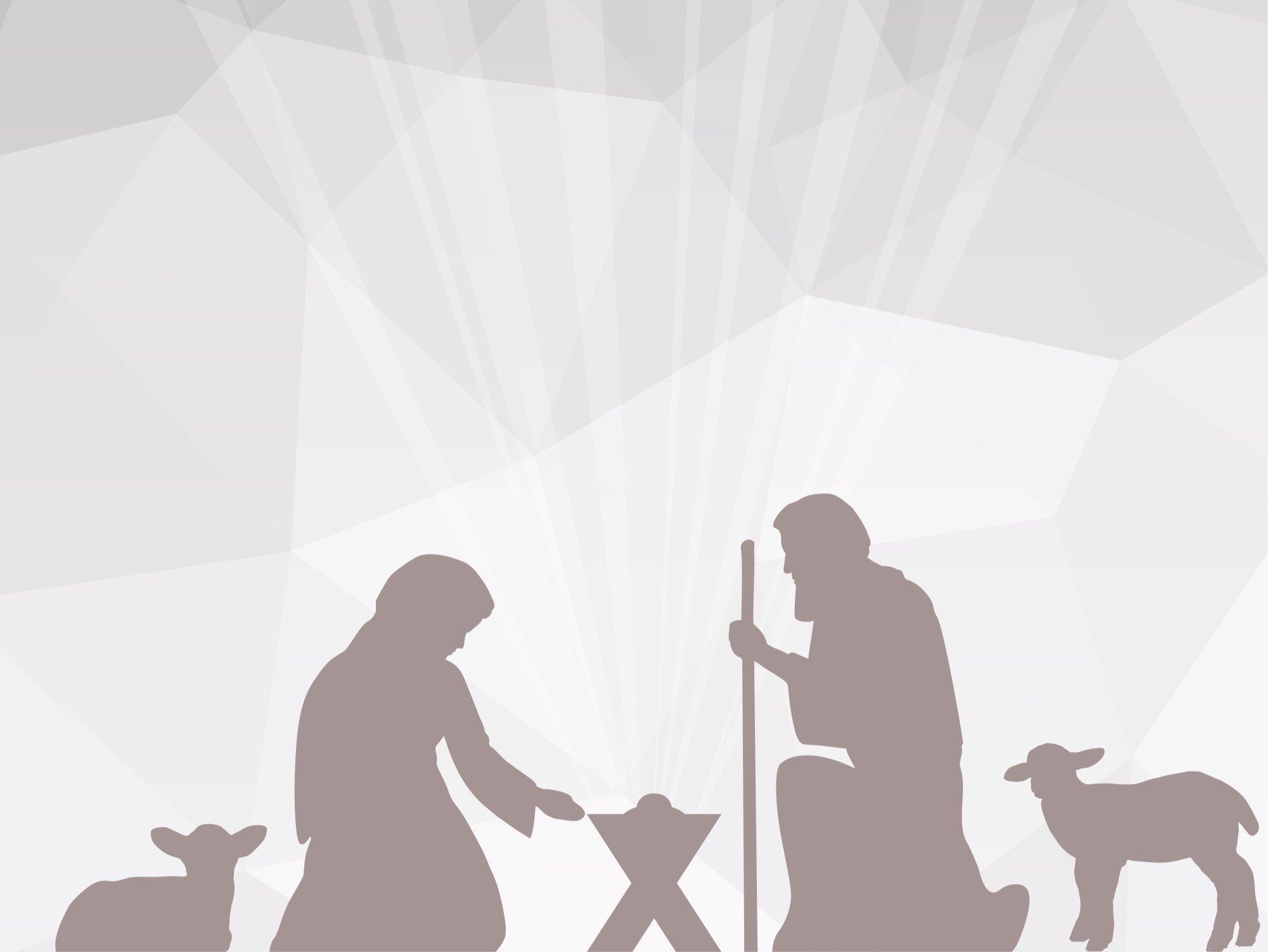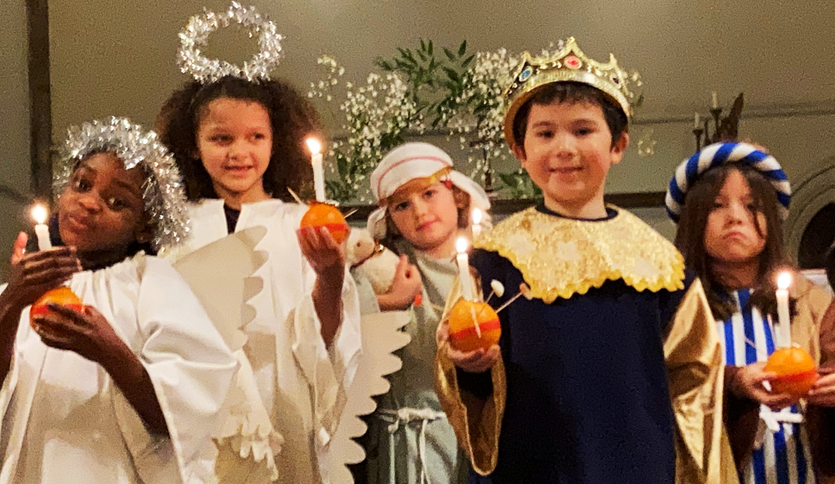
First Sunday after Christmas
Oh, faithful few, who come to church the Sunday after Christmas when so many are on holiday, staying with friends, visiting family. And what reward do you get? The massacre of the innocents.
It’s a bit of a downer after all the Christmas cheer. This is the part of the story we so often skip over: “the voice of Rachel wailing and weeping for her children” recounted in Matthew 2:13-23 and yet, this is why we need Christmas after all.
Innocents are still being massacred. We need the child born in Bethlehem, the one who will, as Isaiah 63:7-9 promises, redeem us in his love and pity. The child of Bethlehem who shows us that all God’s children are precious and call us to follow Joseph’s example in offering protection and refuge.

Christmas Festival Eucharist
On Zoom (Meeting ID: 850 453 964 | Passcode: 670510), YouTube and in church on Christmas Day at 10.30am come together with friends and family for Mass to celebrate the birth of Jesus Christ.
Despite Christmas being a public holiday, religion is largely regarded as private affair, a matter of personal conscience. For Isaiah, 9:2-7, religion was a public and political act: God’s presence would lead to freedom, the end of oppression, cessation of war between nations. He depicts God’s reign in political terms, his messiah will have authority and will rule kingdoms. In contrast, our gospel reading, Luke 2:1-14, presents us with a tiny town in a regional backwater: one small family, a bunch of labouring shepherds: surely not the stuff of political revolutions? Yet, Luke is making a most radical political assertion: he begins the story with the rule of the emperor Augustus and the governor Quirinius and then tells us that God is not working through the powerful and the mighty, but through the ordinary and everyday lives of mothers and labourers, of you and me.

Midnight Mass
Be amongst the first to see in Christmas, at Midnight Mass. Meet at 11.30pm on Christmas Eve in church or online to celebrate the Nativity with a service of lessons and carols.
The birth that takes place in John’s gospel is not the birth of a nation or of a leader, it is our rebirth: we are the ones who are invited to be born again “not of the will of flesh, nor of the will of man, but of God”.

Christingle Service
At 4pm on Christmas Eve, church is transformed for our family Nativity service, complete with readings, carols and a full cast of characters in costume, armed with candles!
Children, bring your family and join in the fun, just please try not to set each other on fire!

Carols by Candlelight
What could be more festive than carols by candlelight?
Bring the whole family down to church on Sunday 18th December at 5.30pm and prepare yourselves for the celebrations ahead.
No previous carol singing experience required!

Fourth Sunday in Advent
On our last Sunday in Advent the readings ponder over the sign God sends to assure us of God’s presence with us. King Ahaz asks the prophet Isaiah, 7:10-26, for a sign that God will be with his people as they face imminent military defeat. Isaiah offers him this; a young woman is with child, she will bear a son who will be called Emmanuel, God is with us. This is not the sign that King Ahaz was expecting. The divine presence he seeks is one of strength and power. The words of the prophesy are echoed in the story of Jesus’ birth in Matthew 1:18-25. Once again, the birth of a child to a young woman is not easy to recognise as a sign of God’s presence with us. Joseph needs the angel Gabriel to explain it to him just as Ahaz needed the prophet Isaiah. With Christmas just a week away we too ponder what it means for God to come not in strength but in vulnerability, where is true divine power to be found and are we able to recognise and embrace it?

Carols in the Village
On Tuesday 13th December at 7pm, we’ll bring a little bit of joy to the world or at least to Abbeville Village.
A merry band of the more and less chorally talented emboldened by mince pies and mulled wine will bring some tuneful cheer to the neighbourhood.

Traditional Service of Lessons and Carols
On Sunday 11th December at 6.30pm, make a bee line for church for a traditional service of lessons and carols.
There is no better way to be reminded of the importance of the Nativity than through this familiar selection of readings and music.

Third Sunday in Advent
Our readings this morning look forward with hope and excitement to a time when God’s kingdom comes: a time of flourishing both for God’s people but also for the whole of creation: the blind will see, the lame will leap, the barren places will bear fruit. However, the route to this kingdom is not the one we might expect: The flourishing described by Isaiah 35:1-10 is to be found in the wilderness, a place of hardship and trial. In Matthew 11:2-11, Jesus castigates those who travel out into the wilderness expecting to find riches and power.

Second Sunday in Advent
Today is the second Sunday in Advent, a day when we celebrate the prophets in every generation who call us to a better future. Prophets are not always popular because they almost always call us to change. John the Baptist, Matthew 3:1-12, is pretty terrifying: munching on locusts, wearing camel skins and warning us of “the wrath that is to come”. He calls us to repent (literally, turn around) and do things differently, to bear good fruit.
Advent Sunday
Today we begin the season of Advent; a season of expectation and preparation, not just for Christ’s birth but his return at the fulfilment of time. It is more than a season of waiting and hoping; it is a time to reflect on our role in preparing the way of the Lord. Isaiah 2:1-5, looks forward this time but also make clear that our role in not a passive one: we are the ones who beat the swords into plough shares and the spears into pruning hooks: we are the ones who will carry out the work of nurture and productivity and growth. In our gospel reading, Matthew 24:36-44, Jesus tells us to be ready, to be alert and awake for the day when he comes. Christ comes to us all the time: we have many opportunities to be active in the healing work of God in the world. During Advent the challenge is not to be so distracted by our preparations to celebrate Christ’s birth that we miss the opportunities to welcome him in our midst.

Christmas Fair
This year, the Christmas Fair will be held on Saturday 26th November between 12noon and 4pm in church.
Come along and join in the festive fun with craft stalls, mulled wine & mince pies, kids' activities and live music.
Entrance is free. Everyone is welcome!

Feast of Christ the King
The Sunday next before Advent marks the end of the church year, an opportunity for us to look back at the year and reflect on what we want from God and what God wants from us in the year ahead.
This Sunday we celebrate the Feast of Christ the King, and we are reminded of what kind of God we follow. Jeremiah 23:1-6 talks of leaders as shepherds, those who nurture and guide and care for their flock. God promises a time when he will raise up a good shepherd to lead his people. The gospel, Luke 23:33-43, reminds us of the cost of this leadership: the good shepherd will give everything for his sheep. We are not just given a leader, we are called to be leaders; we share in Christ’s kingship. At the end of this church year we reflect on whether Christ is the leader we desire to follow and whether we too will take up his call to give of ourselves for the good of his people.

Remembrance Sunday
This Sunday is Remembrance Sunday: a day when we remember, with sorrow and with penitence, all those who have died in conflict. It is also a time to reflect on the causes of conflict and commit ourselves to the difficult work of peace.
Our first reading, Malachi 4:1-2a, written for a people living with conflict and the threat of conflict, promises that those who make war “the arrogant and the evil-doers”, will be burnt in God’s wrath but our gospel reading gives us a different view of God’s justice: In Luke 21:5-19, Jesus acknowledges the impact of war and also the cost for those who stand for peace and the need for endurance.

Third Sunday before Advent
What is Jesus talking about this morning? Are we children of this age? Or children of that age? Children of God? Children of the resurrection? The Sadducees, in Luke 20:27-38, come to him with a strange question attempting to disprove the possibility of resurrection. Like a canny politician, Jesus does not seem to be answering their question. They are speaking at cross purposes: for the concept of resurrection, of an afterlife, arose when there seemed no possibility of justice in this world. If God is just God then there would have to be an afterlife in which justice was done. For Jesus the resurrection starts not in an afterlife, but now, in this life. When we become part of God’s family, children of God, we become part of that movement towards justice and peace that God yearns for. Today we baptise Imogen and Toby: a symbolic moment when they are claimed as children of God, children of the resurrection, children who (together with all of us) will not wait for the next life to work for the kingdom of God to come in this life.

Parish Office Manager
We are currently recruiting for a full-time Parish Office Manager.
Applications to wardens@holyspirit-clapham.org.uk by 30 November 2022.

All Saints’ Day
Today is All Saints Day, a day when we celebrate, not just the saints who forged out faith and inspired us, but also our own calling to be saints. Both of our readings speak of difficulty, and of the hope that allows us to continue to thrive in the face of those difficulties. Daniel 7:1-3, 15-18 gives us a vision of the ocean (the symbol of chaos) from which rise 4 beasts. But despite the strength of the beasts, Daniel is assured that the arc of history will bring justice and peace. Luke 6:20-31 gives us the beatitudes: blessed are the poor, blessed are the hungry, blessed are those who mourn. These do not seem like blessings, but the blessing is in the reversal: those who are poor WILL inherit the kingdom, those who are hungry WILL be filled. The church, the saints, are called to stand in the middle, between the struggle and the triumph: we are the ones who are to fill the hungry, we are the ones to bring joy to those who weep. Today, together with the PCC, we will explore the ways in which we might be called to be the agents of reversal and the agents of blessing in this place.

Last Sunday after Trinity
Our Gospel reading is a sneaky one this morning: Jesus, Luke 18:9-14, tells a parable of the pharisee who prays out loud, assured of his own righteousness, and judgemental of the tax collectors mumbling his prayers in the corner. The tax collector is convinced only of his own failures, yet he is the one who Jesus calls justified. Our instinctive reaction is to judge the pharisee but in doing so we commit the same sin: we are the included not the includers, we are the judged not the judges. Nothing we do, for better or for worse, will make God love us more. And nothing we do will make God love us less. Our ‘righteousness’ or ‘justification’ is the work of God and God alone. As Jeremiah 14:7-10, 19-22, reminds us “we set out hope on you, O Lord our God, for it is you who does all this.”

